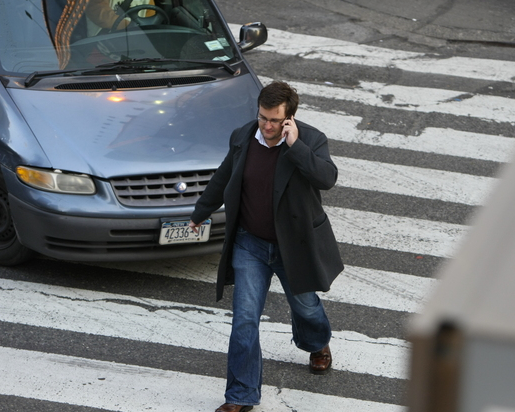Guest Post by Garrick Infanger, Forensic Engineering Hub
Numerous accidents occur each year involving pedestrians. New research is evaluating the effects of impairments on the pedestrians. Impairments can involve physical disabilities, inebriation, or even technology.
In the excellent New York Times series ‘Driven to Distraction’, Matt Richtel examines the effect of modern technology on pedestrians in a new article ‘Forget Gum. Walking and Using Phone Is Risky’.
The era of the mobile gadget is making mobility that much more perilous, particularly on crowded streets and in downtown areas where multiple multitaskers veer and swerve and walk to the beat of their own devices…
Slightly more than 1,000 pedestrians visited emergency rooms in 2008 because they got distracted and tripped, fell or ran into something while using a cellphone to talk or text. That was twice the number from 2007, which had nearly doubled from 2006, according to a study conducted by Ohio State University, which says it is the first to estimate such accidents.
The era of the mobile gadget is making mobility that much more perilous, particularly on crowded streets and in downtown areas where multiple multitaskers veer and swerve and walk to the beat of their own devices…
Slightly more than 1,000 pedestrians visited emergency rooms in 2008 because they got distracted and tripped, fell or ran into something while using a cellphone to talk or text. That was twice the number from 2007, which had nearly doubled from 2006, according to a study conducted by Ohio State University, which says it is the first to estimate such accidents.
The recent bestseller ‘SuperFreakonomics’ deals with
the issue of drunk-walking that involves some of the same issues for impaired walking on a worldwide basis.
Each year, more than 1,000 drunk pedestrians die in traffic accidents. They step off sidewalks into city streets; they lie down to rest on country roads; they make mad dashes across busy highways…
The average American walks about a half- mile per day outside the home or workplace. There are some 237 million Americans sixteen and older; all t old, that’s 43 billion miles walked each year by people of driving age. If we assume that 1 of every 140 of those miles are walked drunk— the same proportion of miles that are driven drunk— then307 million miles are walked drunk each year.
Doing the math, you find that on a per- mile basis, a drunk walker is eight times more likely to get killed than a drunk driver.
Whether an iPhone or a beer, impaired walking seems to be on the rise around the world.
—
